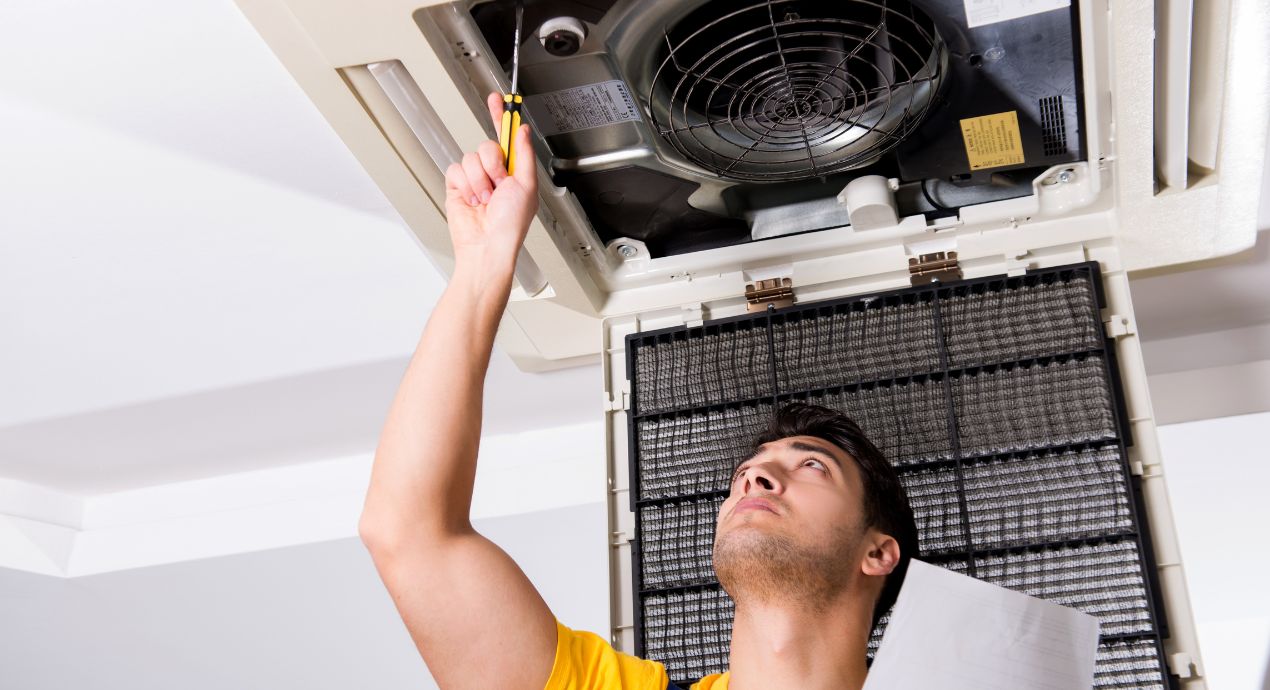
Contemplating coverage?
Subscribe to receive our emails & get
$200 OFF!
Have questions?
Call us: (833) 544-8273


Written By Ellie Brooks
Sometimes it seems like dealing with a malfunctioning central air conditioning system is worse than having no air conditioning at all. If your home doesn't have built-in cooling, you're mentally prepared to endure the heat and humidity. You probably already have standing fans or other inexpensive cooling devices at the ready. But if your central air is on the fritz when the mercury is rising? It's maddening, and you want it fixed quickly.
Some cooling problems will call for central air repair from a professional, but others you may be able to sort out on your own. Liberty Home Guard's central air troubleshooting guide will help you get your bearings.
Where to start with troubleshooting central air systems depends on the nature of your problem.
If your system doesn't engage whatsoever, there's likely a power or wiring issue. Follow these steps to identify and resolve the problem.
1. Check your circuit breaker.
A tripped breaker is the most likely problem. You may have inadvertently overloaded the circuit that supplies power to your air handler or cooling unit. External factors, such as thunderstorms, can also cause power surges.
Check your breaker box and reset the tripped switch if necessary. Try to power on your cooling system again. If the breaker trips again, you may have too many devices plugged into the same circuit. It's also possible that faulty wiring in your cooling system or home electrical system is causing a short. In that case, contact an electrician.
2. Check the power source.
It's unlikely that your cooling unit's power cord would have dislodged from its outlet, but anything is possible. Check the unit to confirm it's plugged into its power source. Correct as needed and test the system to see if your problem is resolved.
3. Test your central heating.
You can narrow down the source of your problem by testing your heating system. If warm air comes out of the registers, then you know your thermostat, fan, and wiring are in working order. This suggests that your air conditioning unit needs to be serviced or replaced.
If your heating doesn't work either, then there could be a wiring problem with your thermostat. Try other thermostats elsewhere in your home. If others work, then you have an isolated problem with a single thermostat. If all of them fail to turn on the heat, then there's a flaw somewhere further up the system that will require the attention of an electrician or HVAC specialist.
You might notice that the system engages—it makes noise or indicator lights illuminate—but no air, cool or otherwise, blows from the vents. Here's how to make sense of it.
1. Check your registers for blockages.
First determine if the lack of airflow is affecting one register or all of them. A localized issue is almost certainly due to a blockage. The register may be obstructed by a rug or piece of furniture, or there could be a blockage somewhere in the ductwork. You can try reaching into the duct or probing it with a long implement but be careful not to push the blockage in farther. If only one register is affected but you can't identify an obvious blockage, contact an HVAC professional.
2. Test your fan.
If none of your registers appear to be allowing airflow, try turning on the fan only at your system control panel. If you still don't get any air circulation, there's likely a problem with the fan itself or the blower motor. Contact your system's manufacturer or a professional HVAC specialist to have the problem diagnosed and resolved.
If you notice warm air blowing from your registers, your system is probably mechanically functional but suffering from a faulty cooling unit. Here's what you can check:
1. Check your filter.
Dirty filters are among the most common causes of HVAC issues. Most manufacturers recommend changing or cleaning filters every 90 days, but some homeowners can go many months or years without addressing this important maintenance task. When a filter is choked with dust and debris, it impedes airflow and contributes to overall inefficiency.
Check your air conditioning unit's filter. Refer to your owner's manual as needed for instructions about where to find the filter and how to remove it. Some filters need to be discarded and replaced; others can be manually cleaned.
2. Inspect your condenser.
Outdoor condenser units are exposed to the elements, and accumulated leaves, twigs, soot, and other debris impede the appliance's efficiency. Check your condenser and clean it as necessary. Brush away large pieces of debris and use a gentle spray from your garden hose to remove finer particles.
3. Look for frost or sediment on your evaporator coils.
If your outdoor unit is in good shape, your air conditioning problem could stem from smothered evaporator coils inside. Check the indoor handler for the panel of U-shaped coils. If they're covered in frost or dust, power down the unit and clean the coils with a damp cloth.
4. Check for refrigerant leaks.
A functional air conditioning system is self-contained, but general wear and tear can lead to a refrigerant leak. This in turn causes the system to work harder to achieve the same degree of cooling.
Inspect your unit for obvious signs of leaks. If you notice refrigerant pooling or leaking, contact a professional technician.
Not every home appliance problem is resolved by resetting a switch at the circuit breaker. When something fails after years of wear and tear, turn to Liberty Home Guard for help. Our policies can ensure that your equipment is repaired or replaced swiftly, affordably, and correctly.
Use our website for a free quote or call (866)-432-1283.
Stay Ahead of Potential
Home Mishaps!
Subscribe to our Liberty Home Guard Newsletter and gain access to exclusive content that ensures your peace of mind.